Jun 02
Posted: under Activities, photography, Wildlife.
Tags: Activities, census, documentation, photography, wildlife management June 2nd, 2017
Yesterday morning as I went outside, I saw a very small cicada on the kitchen storm door. I thought immediately of one seen some years back (turned out to be four years) in the same place, photographed then and identified by Bill Reynolds, an expert on cicadas at BugGuide.net. First I went back inside and […] [...more]
Yesterday morning as I went outside, I saw a very small cicada on the kitchen storm door. I thought immediately of one seen some years back (turned out to be four years) in the same place, photographed then and identified by Bill Reynolds, an expert on cicadas at BugGuide.net. First I went back inside and got the camera, then photographed it, then went to BugGuide to compare…and sure enough, it’s the same critter. Length about 1/2 inch (not counting wings.)
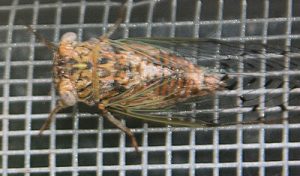 Pacarina puella Little Mesquite cicada
Pacarina puella Little Mesquite cicada
Read the rest of this entry »

Jun 19
Posted: under Activities, Land, photography, Plantlife, Wildlife.
Tags: Activities, beauty, bird behavior, native plants, natural water, photography June 19th, 2016
The rain stopped a week ago; the winter grasses are brown or browning, the early wildflowers have gone to seed. But soil moisture is still good. The tallgrasses (switchgrass, Eastern gama, Indiangrass, big bluestem) are doing very well (switchgrass in the secondary drainage is taller than we are.) There’s an area in the east grass […] [...more]
The rain stopped a week ago; the winter grasses are brown or browning, the early wildflowers have gone to seed. But soil moisture is still good. The tallgrasses (switchgrass, Eastern gama, Indiangrass, big bluestem) are doing very well (switchgrass in the secondary drainage is taller than we are.) There’s an area in the east grass we call “The Bowl” because it’s a roundish area that seeps in wet weather as it slopes down to the old drainage line. It stays green longer. When we got the place, it was covered with broomweed (non-native), bare under the broomweed with a few scattered grass plants, not doing well because of the chemical defense of the broomweek. Today it looks like this:

You can see the upslope edge (pale beige of dry grass)
Every different shade of green, every native plant, reveals something about the soil where it is.
Read the rest of this entry »

Jun 19
Posted: under Activities, photography, Plantlife, Water, Weather.
June 19th, 2016
Most but not all the surface water has dried up, soils that were seeping and running with water last week are dry enough to walk on in regular shoes. Main grass: Queen Anne’s Lace, gaillardia, scattered bluebonnets stiff-stem prairie flax, coreopsis, goldthread, Venus’s looking glass, skullcap, green antelope horns, others [...more]
Most but not all the surface water has dried up, soils that were seeping and running with water last week are dry enough to walk on in regular shoes.
 Main grass: Queen Anne’s Lace, gaillardia, scattered bluebonnets
Main grass: Queen Anne’s Lace, gaillardia, scattered bluebonnets
stiff-stem prairie flax, coreopsis, goldthread, Venus’s looking glass,
skullcap, green antelope horns, others
Read the rest of this entry »

Jun 19
Posted: under Activities, Land, photography, Water, Weather, Wildlife.
June 19th, 2016
Earth Day 2016 It had rained in the day before, and dawned cool, with a northeast breeze–a perfect day to go checking the water quality on the east half of the place. Not as much rain as the previous weekend, so with some difficulty I was able to make it from place to place in […] [...more]
It had rained in the day before, and dawned cool, with a northeast breeze–a perfect day to go checking the water quality on the east half of the place. Not as much rain as the previous weekend, so with some difficulty I was able to make it from place to place in ordinary walking shoes. In the distance, the line of woods along the seasonal creek; to the left the “dry woods” growing on a hump of rock. Out of sight to the left, the line of trees along an old ditch dug by a former farmer, intended to carry runoff from the highway to the south property line . A beautiful day, with signs of recovery from the drought…and signs of much management still needed.
Read the rest of this entry »

Jul 21
Posted: under Activities, photography, Plantlife.
Tags: grass, photography, prairie restoration July 21st, 2015
Why it’s called BIG bluestem: the pole is six feet tall Four grasses form the foundation of the tallgrass prairie biome in the US: Big Bluestem, Switchgrass, Indiangrass, and Eastern Gama. Before this land was broken to the plow, fingers of tallgrass prairie existed here in the wetter lower spots, with midgrass (Little Bluestem, Sideoats […] [...more]
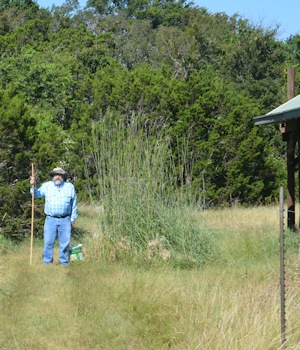 Why it’s called BIG bluestem: the pole is six feet tall
Why it’s called BIG bluestem: the pole is six feet tall
Four grasses form the foundation of the tallgrass prairie biome in the US: Big Bluestem, Switchgrass, Indiangrass, and Eastern Gama. Before this land was broken to the plow, fingers of tallgrass prairie existed here in the wetter lower spots, with midgrass (Little Bluestem, Sideoats Grama, Vine Mesquite, etc) prairie on dryer slopes and shortgrass on the rockiest areas. This is not quite the southernmost bit of tallgrass country, but it’s getting there. Read the rest of this entry »

Apr 13
Posted: under Activities, photography, Plantlife, Water, Weather, Wildlife.
Tags: Activities, beauty, drought, native plants, photography April 13th, 2013
It was a dry fall, after a dry summer, and a dry winter followed the dry fall. Other places got rain–sometimes nearby–but we had none for months. March brought a little–April has brought a little–and now we have some flowers. The bluebonnets may be only 4-5 inches tall, instead of knee-high, but they’re there–in a […] [...more]
It was a dry fall, after a dry summer, and a dry winter followed the dry fall. Other places got rain–sometimes nearby–but we had none for months. March brought a little–April has brought a little–and now we have some flowers.
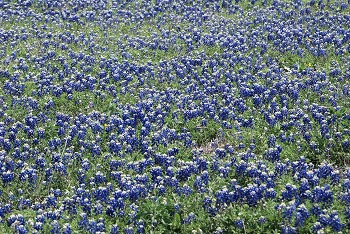
The bluebonnets may be only 4-5 inches tall, instead of knee-high, but they’re there–in a few places–and should be able to make seed for another year. We had more through most of the dry winter, but many finally just died–or were eaten, since they were the only green thing out there.
Read the rest of this entry »

Dec 01
Posted: under Activities, photography, Plantlife, Wildlife.
Tags: Activities, fencing, native plants, observation, photography December 1st, 2011
In our house, fencing has two meanings: the stuff I do with swords (Renaissance style) and the stuff we both do with posts and wire and clamshell posthole diggers and shovels and so on. Often my husband works on fence alone. I have books to write. When he’s sick or injured, the fence projects languish…and […] [...more]
In our house, fencing has two meanings: the stuff I do with swords (Renaissance style) and the stuff we both do with posts and wire and clamshell posthole diggers and shovels and so on. Often my husband works on fence alone. I have books to write. When he’s sick or injured, the fence projects languish…and sometimes it’s just too hot to get out there.
Winter is a fine time to work on fence, and he’s been busy on the west end fence since some windstorms dropped trees on it.
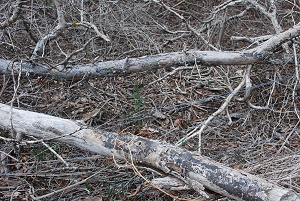 Yes, there’s a fence under that limb nearest the camera.
Yes, there’s a fence under that limb nearest the camera.
Read the rest of this entry »

Jun 23
Posted: under Activities, Water, Wildlife.
Tags: Activities, water resource management June 23rd, 2011
On land with no permanent water source, rain harvesting is the only way to provide reliable supplemental water for wildlife. (Well, you can lug it in on your back or a cart or trailer, but that’s no fun at all when temperatures top 100F day after day.) And rainwater is a healthier source of water […] [...more]
On land with no permanent water source, rain harvesting is the only way to provide reliable supplemental water for wildlife. (Well, you can lug it in on your back or a cart or trailer, but that’s no fun at all when temperatures top 100F day after day.) And rainwater is a healthier source of water for some (most?) wildlife than treated city water, even if that were affordable and available. Supplying supplemental water is a key activity in the support of wildlife, critical in times of drought. So, over the years, we’ve built “rain barns” to capture and store rainwater for this purpose. We also do rainwater collection off existing roofs (house, carport, horse barn) to provide water for the horses, water garden, and a few trees.
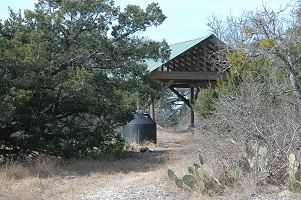 Fox Pavilion: 610 gallons storage max
Fox Pavilion: 610 gallons storage max
Read the rest of this entry »

May 24
Posted: under Activities, Climate Change, Water, Wildlife.
Tags: Activities, amphibians, Animal behavior, beauty, documentation, observation, photography, wildlife management May 24th, 2010
Young Rana berlandieri with last of its tail showing. [...more]
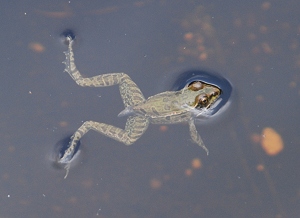 Young Rana berlandieri with last of its tail showing.
Young Rana berlandieri with last of its tail showing.
Read the rest of this entry »

May 10
Posted: under Activities, photography, Plantlife, Wildlife.
Tags: Activities, Animal behavior, beauty, butterflies, identification, insect, native plants, new species, photography, wildlife management May 10th, 2010
Because of time constraints (working on copy edits for new book) and weather, the brief walk on the land Saturday didn’t produce any usable bird pictures and I didn’t see any snakes or lizards, but I did see wildlife, large and small: [...more]
Because of time constraints (working on copy edits for new book) and weather, the brief walk on the land Saturday didn’t produce any usable bird pictures and I didn’t see any snakes or lizards, but I did see wildlife, large and small:
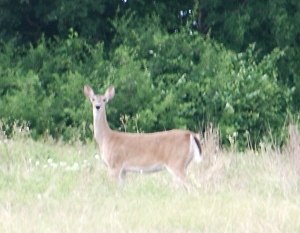 Read the rest of this entry »
Read the rest of this entry »











